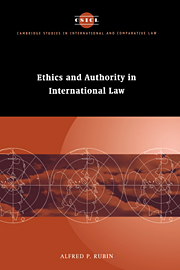Book contents
- Frontmatter
- Contents
- Preface
- Acknowledgments
- List of abbreviations
- Table of cases
- Table of statutes
- Table of treaties
- 1 Introduction
- 2 The international legal order
- 3 Theory and practice come together
- 4 Putting it together
- 5 Implications for today
- Bibliography
- Index
- CAMBRIDGE STUDIES IN INTERNATIONAL AND COMPARATIVE LAW
4 - Putting it together
Published online by Cambridge University Press: 14 September 2009
- Frontmatter
- Contents
- Preface
- Acknowledgments
- List of abbreviations
- Table of cases
- Table of statutes
- Table of treaties
- 1 Introduction
- 2 The international legal order
- 3 Theory and practice come together
- 4 Putting it together
- 5 Implications for today
- Bibliography
- Index
- CAMBRIDGE STUDIES IN INTERNATIONAL AND COMPARATIVE LAW
Summary
The rise of positivism and the naturalist reaction
The development of conflict of laws, with its emphasis on the municipal law bases for jurisdiction to prescribe, to enforce and to adjudicate, and its “choice-of-law” solution to the inconsistencies created by jus gentium theory in a world of equal “sovereigns,” was accompanied by a great simplification and refinement of basic “positivist” jurisprudence. Joseph Story's seminal book was published in 1834. It is probably evidence of a Zeitgeist that John Austin's lectures, The Province of jurisprudence Determined, were delivered in 1832, very shortly before.
In his introduction, Austin divides “law” into four categories: divine law, positive law, rules of “positive morality” and “laws metaphorical or figurative.” He defines “natural law” as either a part of divine law, a sort of positive morality, or only figuratively called “law.” He goes on:
The positive moral rules which are laws improperly so called, are laws set or imposed by general opinion … Some are set or imposed by the general opinion of a larger society formed of various nations … And laws or rules of this species, which are imposed upon nations or sovereigns by opinions current amongst nations, are usually styled the law of nations or international law (emphasis sic).
Note that to Austin, publishing in 1832, the phrases “law of nations” and “international law” are synonymous, reflecting the shift in concept and language of his time.
- Type
- Chapter
- Information
- Ethics and Authority in International Law , pp. 138 - 169Publisher: Cambridge University PressPrint publication year: 1997

